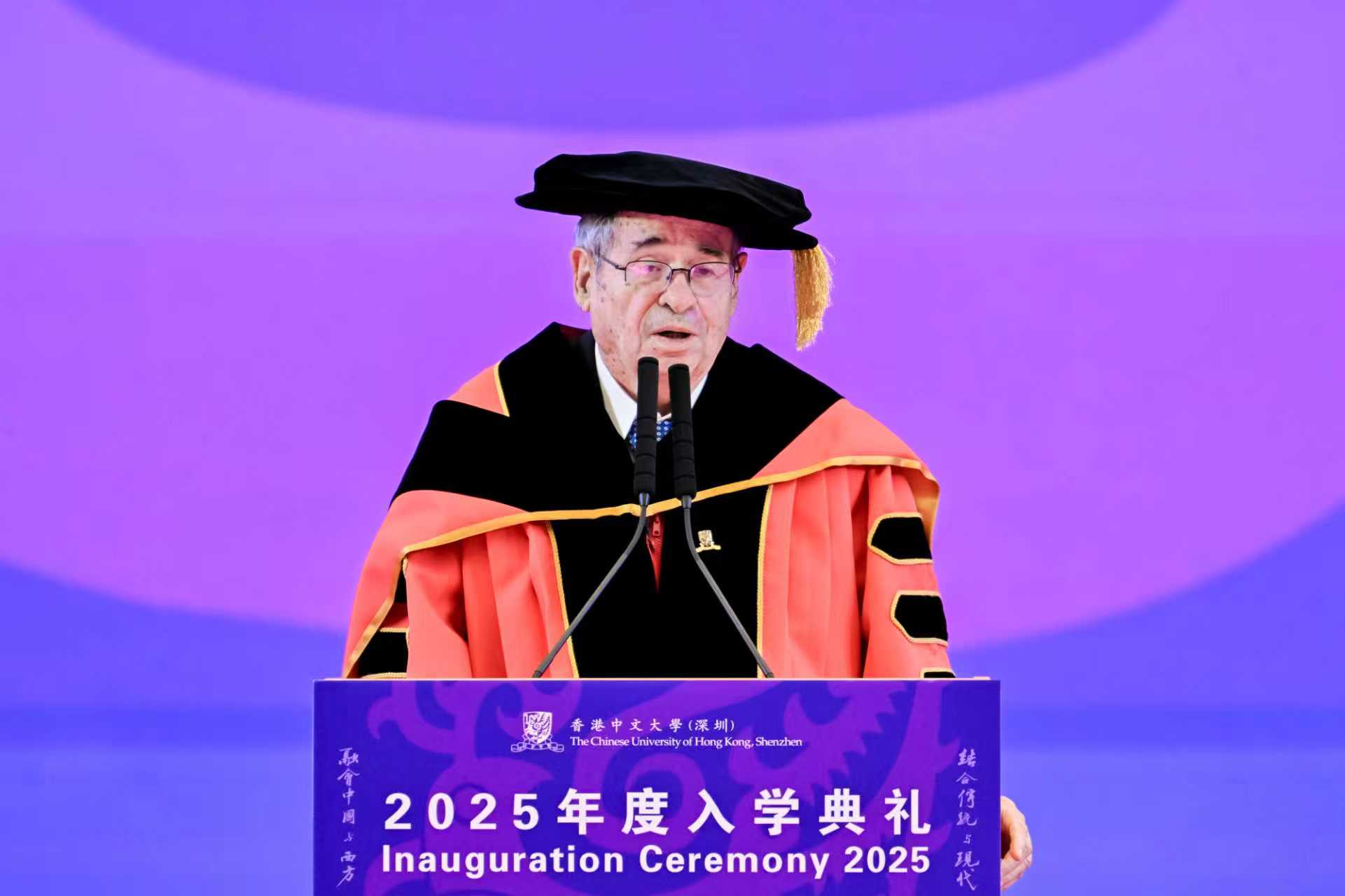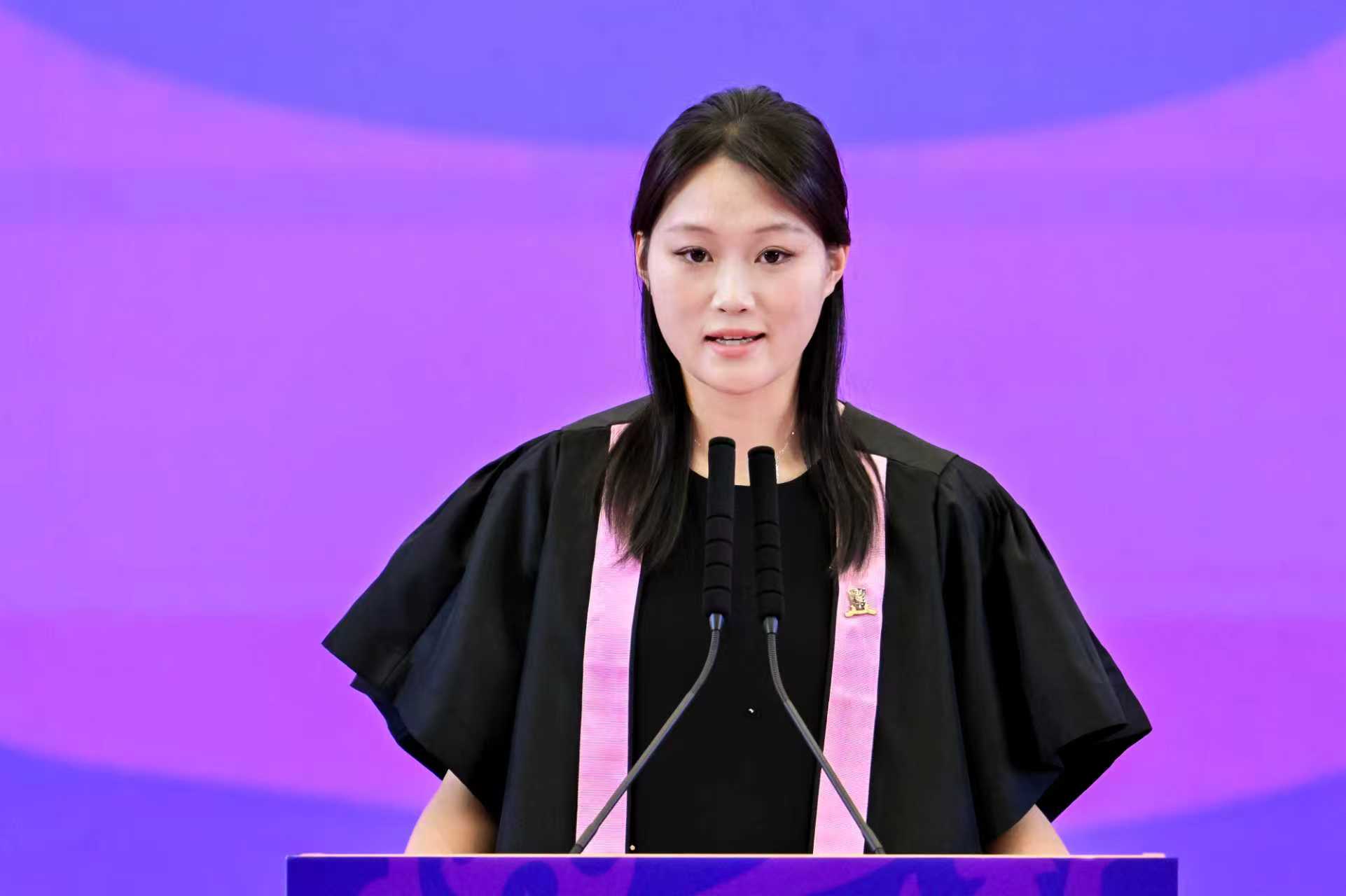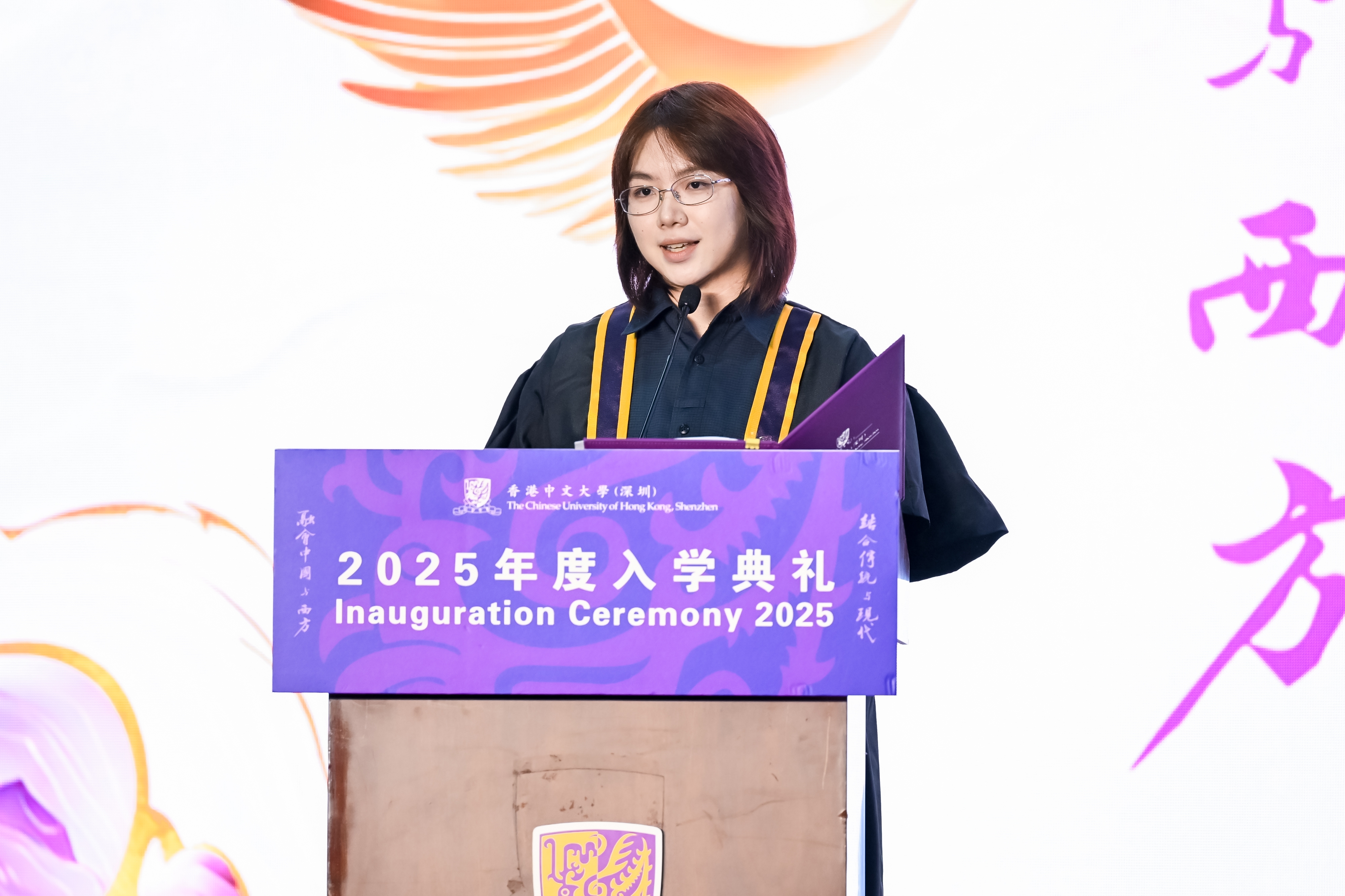CUHK-Shenzhen Holds Inauguration Ceremony for students 2025
August 30, 2025?– The Chinese University of Hong Kong, Shenzhen (CUHK-Shenzhen) held its?Inauguration Ceremony for Students 2025, welcoming over 4,600 undergraduate and postgraduate students from around the world to embark on a new journey. President Xu Yangsheng and University Leadership, alongside representatives from the University Governing Board and faculty, joined undergraduate and doctoral freshmen in the main venue at Liwen Hall for the ceremony. Master's students participated simultaneously via livestream in the University Sports Hall. Parents of new students and guests from various sectors witnessed the students embarking on this new life chapter online.
?
Professor Lo Yuk Ming, Chairman of Governing Board of CUHK-Shenzhen and Vice-Chancellor of The Chinese University of Hong Kong, University Distinguished Professor and 2012 Nobel Laureate in Chemistry Professor Brian K. Kobilka, University Distinguished Professor and 2013 Nobel Laureate in Chemistry Professor Arieh Warshel, undergraduate freshman representative Huang Yinuo, postgraduate freshman representative Shi Yuxin, and President Xu Yangsheng delivered speeches at the ceremony.
?

Professor Lo Yuk Ming, Chairman of Governing Board of CUHK-Shenzhen and Vice-Chancellor of CUHK: Aim High, Start Well and Keep Resilient
Professor Lo Yuk Ming, Chairman of Governing Board of CUHK-Shenzhen and Vice-Chancellor of The Chinese University of Hong Kong, addressed the?ceremony?as Chairman for the first time. Quoting Plato's " The beginning is the most important part of the work," he reflected on his own journey into "the development of non-invasive, safe and accurate prenatal tests" research, encouraging students to set long-term goals and formulate practical plans as they set sail on their quest for knowledge. "Time spent planning at the beginning of a journey can often save many multiples of that time down the road. But better still, you don't have to do the planning alone. You'll find that your teachers and fellow students here at CUHK-Shenzhen will be more than happy to share with you their thinking and experiences."
Citing Nobel Laureate Professor Sir Paul Nurse, Professor Lo emphasized that success stems not from perfection, but from resilience and adaptability to changing environment. "Like the evolution of life, which usually takes longer than we can imagine, the seed of diligence you sow may not readily bear the fruit of triumph today. It takes time, perseverance, as well as invaluable support from those around you to sculpt the pathway to your aspirations. So hold on to the belief that the dreams you nurture today will define you tomorrow."
Professor Lo encouraged freshmen to develop an interdisciplinary mindset: the ability to integrate knowledge and skills from different subjects and to think outside of the box to create innovative solutions to complex problems. "I sincerely invite you to make good use of the diverse educational opportunities offered by the University to enrich yourself both intellectually and morally, just as the University motto says, 'Through learning and temperance to virtue,' and putting equal emphasis on learning and character building. Despite the uncertainty of tomorrow, embrace your future with courage and vision and determination. No matter what path you take, I hope you will follow in the footsteps of many graduates of CUHK-Shenzhen who have distinguished themselves through service, professional expertise, and personal qualities and left an indelible mark on society."
?

Professor Brian K. Kobilka, University Distinguished Professor and 2012 Nobel Laureate in Chemistry: Follow Your Passion, Embrace the Challenge
2012 Nobel Laureate in Chemistry Professor Brian K. Kobilka, reflecting on his scientific career, encouraged students to lay the foundation for their future in the next four years, using passion, mentorship, self-awareness, and life balance as guiding beacons to begin new chapters in university and life.
Professor Kobilka summarized four points for students to achieve certain results: "First, I found my passion, something I loved to do, and a challenging goal that I wanted to pursue. Second, I was able to find role models and mentors who provided guidance at different stages of my career. Third, I recognized my strengths and weaknesses, and found ways to leverage my strengths and accommodate for my weaknesses. Fourth, I had balance in my life, that is, a fulfilling family life outside of my academic career."
Looking at the present and future, he highlighted numerous global challenges facing the world—regional conflicts, poverty, and climate change—and called for interdisciplinary collaboration to address them. " While we may end wars, prevent a nuclear confrontation, and reduce world poverty, climate change may be irreversible." He expressed hope that more students would dedicate themselves to solving these challenges and wished the freshmen "success in the next four years as you lay the foundation for your future."
?

Professor Arieh Warshel, University Distinguished Professor and 2013 Nobel Laureate in Chemistry: Find Your Path Through Exploration
University Distinguished Professor and 2013 Nobel Laureate in Chemistry Professor Arieh Warshel used his unique educational experience to encourage freshmen to calmly face future uncertainties. He recalled choosing chemistry upon entering university merely based on a friend's joking remark, "You have very good eyesight, you have to study chemistry." Yet, this accidental start led him onto the path of scientific research. To freshmen feeling uncertain about the future, he said: "I'm sure that you are very worried about what class to choose. And in fact, it is not so important. You have to choose classes in the basic fields—those of you who are in science: mathematics, physics and chemistry—so you will have the background in the future to ask questions in other fields."
Professor Warshel mentioned that in his junior year, he accidentally found his lifelong research direction through a project studying enzymes chymotrypsin. Subsequently, he was fortunate to be among the first scholars to use computers to study molecules, ultimately winning the Nobel Prize for his groundbreaking "quantum mechanics/molecular mechanics (QM/MM) methods." He encouraged students to actively discover and challenge difficult problems: "At some stage, you will suddenly find a very interesting problem that you will try to solve. And it's better to be a relatively difficult question because otherwise it was already solved by other people."
Addressing the current wave of artificial intelligence, Professor Warshel specifically advised freshmen: "I'm not telling you not to use AI, but remember it's very, very important to develop the ability to understand what happened and not just to trust the answer from some AI machine that might or might not be correct because one day you will have to direct the research and not allow AI to do so."
Finally, he hoped students would actively build friendships, expand international collaborations, develop some interests and enjoy time beyond their studies while delving into academics.
?

Professor Xu Yangsheng, President of CUHK-Shenzhen, on Cultivating Innovators: Learning, Thinking, Practice, Comprehending — The Power of Focus and Reflection
President Xu Yangsheng discussed how to navigate university life and grow into innovative talents needed by future society in his address, distilling the philosophy of university education into four characters: "學 (Learning), 思 (Thinking), 踐 (Practice), 悟 (Comprehending)."
First, "Learning" is the foundation. Recently, various Schools have completed a new round of curriculum enhancement, utilizing AI empowerment, keeping pace with disciplinary frontiers, and meeting the needs of national and societal future development.
Second is "Thinking." In the age of artificial intelligence, where knowledge acquisition is increasingly convenient, critical thinking and independent reasoning abilities are becoming ever more important.
Third is "Practicing." Start from daily life, participate more in internships, experiments, extracurricular activities, voluntary teaching, and social research. You must immerse yourself in real-world experience, reflect on it in writing, synthesize your findings into publishable outcomes, and ultimately share these insights with others.
Fourth is "Comprehending." It is the deep integration and intellectual leap after learning, thinking, and practicing. "Comprehension" is the seed of your own thought, which will take root, blossom, and bear fruit in your life. The more and deeper your comprehension, the more precious it becomes.
Additionally, President Xu offered two suggestions to the freshmen:
First, cultivate focus. "Focus" might be the most important factor affecting one's learning outcomes. In our era, "focus" is becoming increasingly scarce. Those who understand self-discipline and delayed gratification are certainly more likely to achieve success.
Second, do not give up thinking. People are accustomed to referencing information from internet, and thinking is gradually being "outsourced." Thinking is the fundamental ability that distinguishes humans from other creatures, the cornerstone of human innovation and civilizational progress. Never cease striving in the prime of life, nor silence thought in the age of reason.
Concluding his address, President Xu expressed earnest expectations for the freshmen: "I hope you will often experience the pure joy of learning, the satisfaction of truth-seeking. I hope you will be brave enough to explore and change. The entire CUHK-Shenzhen family is behind you."
?

Huang Yinuo, Undergraduate Freshman Representative: The Future Belongs to the Courageous "Mixed Fabric" Talent
Huang Yinuo, from Diligentia College and School of Data Science, representing the undergraduate freshmen, shared her understanding of "mixed fabric" talent and her personal growth experiences. She stated that it is precisely this versatile and interdisciplinary characteristic that brings together students from different backgrounds at CUHK-Shenzhen, and it is this innovation-driven city and this University that blends Chinese and Western traditions that give them the confidence to break boundaries.
Quoting President Xu's view that "humanities and science are two sides of the same world," she emphasized the need not to make binary choices between so-called "artsy" or "sciencey," "traditional" or "global," but to firmly pursue a path of inclusive growth. "In a time that demands creativity as much as expertise, empathy as much as analysis, this campus didn't just welcome our contradictions; it built itself around them. Here, our love for science and art won't compete—they'll collaborate. Our roots in tradition and hunger for innovation won't clash—they'll create something entirely new. And this spirit of embracing diversity will be our guide: it helps us better integrate into our college, into this campus, into Shenzhen, and into the world awaiting."
?

Shi Yuxin, Postgraduate Freshman Representative: Rooted in Virtue, Reaching through Learning — Toward a Vast World
Shi Yuxin, from Duan Family College and the MSc in Accounting programme from School of Management and Economics, fondly recalled her connection with CUHK-Shenzhen. Starting from the University motto "博文約禮"(Through learning and temperance to virtue), she shared her understanding of the university spirit and personal growth. "'博文' (Broad Learning) doesn't mean piling up knowledge, nor does it mean chasing for purely utilitarian goals. As Francis Bacon wrote in Of Studies: 'Study serves for delight.' Learning should be a source of joy and nourishment. Its value lies not only in the outcomes it yields, but in the process of discovering and embracing what truly inspires us. Passion is the force that carries us further."
She encouraged all freshmen to make full use of the University's diverse, open, and vibrant platform, to delve into academics while also experiencing life and daring to explore, to discover passions and pursuits. Finally, she wished her fellow students to be as passionate and persevering as the Bauhinia flower, rooted in the University motto, setting sail from CUHK-Shenzhen towards a broader world and a more expansive future.
?
The year 2025 marks the beginning of CUHK-Shenzhen's second decade. Students from across the world will open a new chapter at this continuously ascending institution. They will also, together with the University, continue its glory, set sail again, and usher in a new era with their youth and dreams.
This year, CUHK-Shenzhen welcomed over 4,600 new undergraduate, master's, and doctoral students for the class of 2025. This includes over 1,800 undergraduate freshmen and over 2,800 postgraduate freshmen. Among them are 254 international undergraduate students and 196 international exchange students, hailing from 27 countries including China, the United States, the United Kingdom, Australia, Singapore, Italy, Japan, Indonesia, Kazakhstan, Greece, France, and Mongolia. Fifty-five world-renowned universities, such as Durham University (UK), Bocconi University (Italy), National University of Singapore, Waseda University (Japan), Australian National University, and Rutgers University (USA), have selected exchange students to study at CUHK-Shenzhen this year.
Young people from across the globe, bringing diverse backgrounds and lofty aspirations, converge at CUHK-Shenzhen's academic community. Setting forth from the Fairy Lake, they will engage with international scholarly collaboration and global issues through solid academic foundation and broad perspectives—growing into their best selves through exploration and innovation.
?
Writer: Candice Li





